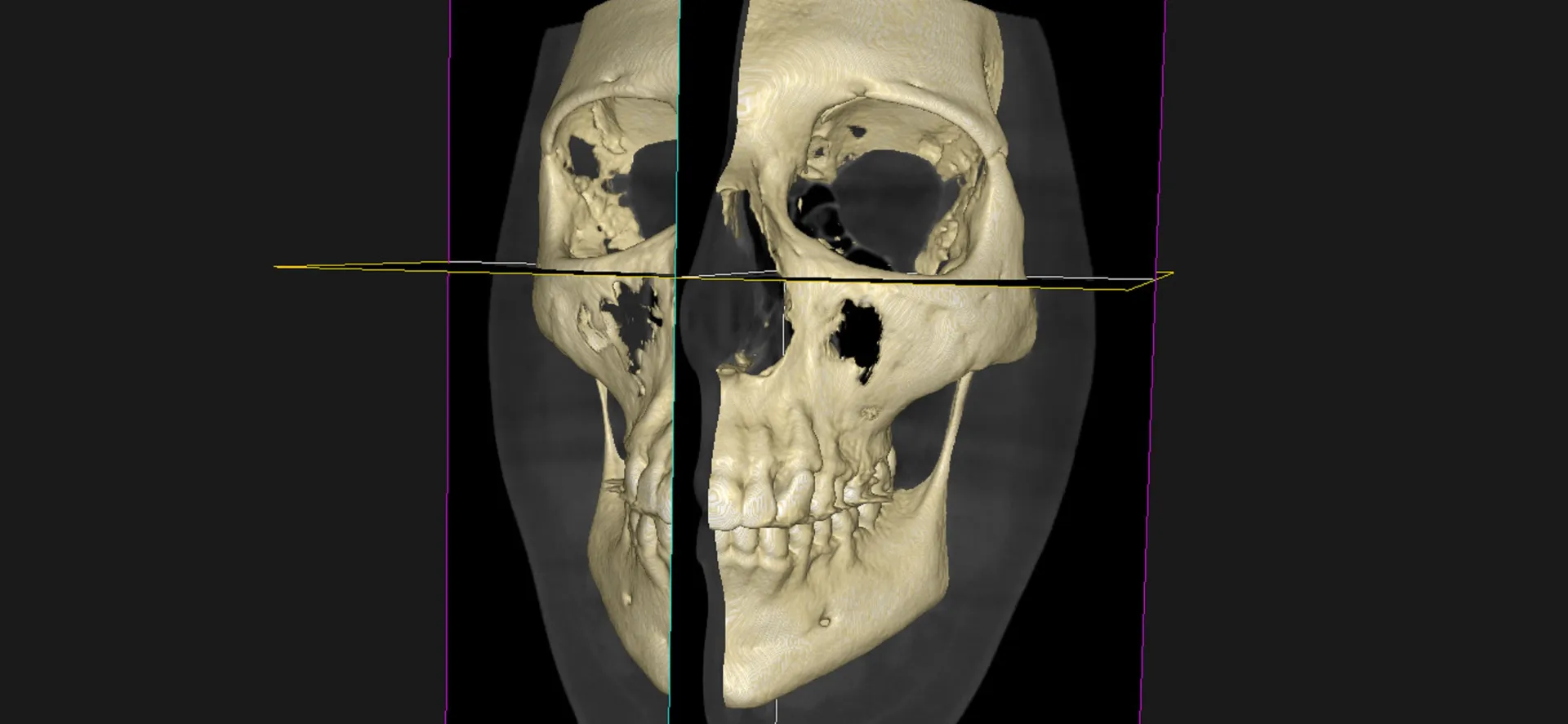Postgraduate Degree in Oral and Maxillofacial Radiology
Home
- Type of programme
- Postgraduate degrees
- Campus
- Campus Sant Cugat
- Duration
- 10 months
- Credits
- 30 ECTS
- Language
- Spanish (secondary language: English)
- Places
- Limited
- Modality
- Blended learning/Online
Objectives
- To provide students with the main management concepts and tools they need, so that they can be able these aspects in their own dental clinics or professional workplace.
- Students will receive a diploma attesting to their knowledge in this field.
- The course professors are experts in each of their different areas, and they take a practical approach that adapts to the curricular profile of the students.
The fundamental objective of the study plan for the Postgraduate Degree in Oral and Maxillofacial Radiology at the Universitat Internacional de Catalunya is to train professionals who are capable of applying the scientific knowledge and technical skills acquired to provide oral and maxillofacial radiology in an ethical, efficient and safe manner.
To meet this fundamental objective, the study plan we propose covers the following:
- An understanding of the principles, means and protection measures required when dealing with radiation, as well as how to handle different dental x-ray equipment.
- Providing students with the ability to design, analyse, execute and interpret radiological images in Dentistry. Knowing how to employ different radiographic techniques. Knowledge of how to use highly specialised software to diagnose the oral and maxillofacial region through imaging.
- The ability to develop knowledge and skills related to the methodological aspects of oral and maxillofacial radiology, with special emphasis on teaching and research possibilities.
- To show the ability to share scientific knowledge, according to the accepted criteria of presentation, writing and publication in the scientific community.
- Management abilities, so that dental specialists have the necessary skills to manage his or her own diagnostic centre.
In order to properly build the specific skills required for this degree, we have established a correlation between each skill and the objectives set, to ensure that they have been covered satisfactorily.
Academic accreditation
- 30 ECTS, Postgraduate Degree in Oral and Maxillofacial Radiology
Competences
In the various fields of action of the Specialist in Oral and Maxillofacial Radiology, competences include:
In relation to the previous considerations about image exams
To be undertaken by professionals whose standard criteria is to protect their patients according to the international regulation for the reduction of the radiation doses to a reasonable minimum in order to obtain diagnostic benefits (ALARA criteria).
In order for your professional work in Oral and Maxillofacial Radiology to always consider the cost-benefit relationship between the characteristics and quantity of the exams that are necessary and most suitable for each particular case then thisneeds to be considered. The reason for this is so that your activities can be undertaken in the way that causes the least damage when using ionising radiation and also with a view to the most suitable level of resolution of clinical concerns for which each patient will have been informed about the respective image examinations that will be used.
Given the continuous progress on the scientific and technological progress in Oral and Maxillofacial Radiology places a critical attitude and permanently updates information which allows them to suitably adopt the concepts which constitute a benefit to this discipline in dentistry in order to put them into practice, the reason why continuing academic education is its natural characteristic.
The image examinations themselves
Students must acquires the skills to correctly indicate conventional and highly complex imagine examinations according to the characteristics of each clinical profile, with one of them being a permanent advisor for general dentistry, specialist dentistry and, sometimes, also a medical surgeon, in order to suitably complement the information coming from clinical discoveries in the oral and maxillofacial fields.
In this way Oral and Maxillofacial Radiology contributes to the various stages involving the diagnosis, control and the treatment of local pathologies, while generating information which complements clinical discoveries and allows students to estimate the prognosis for existing pathologies.
Students must be trained to undertake conventional radiographic exams, as well as ensure that they are critically and correctly advised when undertaking the most complex exams, with the aim of always using the available technology efficiently on the private and public network of image provider services.
This professional has the most authority to interpret the images obtained from these exams both in terms of pathologies related to the motive that led to the exam request, and in terms of the discoveries made thereby, always based on the aim of returning to or preserving good oral health. The healthcare team will provide this as a comprehensive service to their patients.
In terms of their tasks in the healthcare team
In order to do this these professionals must be able to work in a team, whenever Oral and Maxillofacial Radiology activities are in essence an activity involving advice and are complementary to clinical activity, whatever the dental specialisation and eventually the medical specialisation is, that requires their services.
Likewise, the image discoveries can be correlated with the clinical and epidemiological realities of each individual in particular and of the entire population in general and, since he or she also knows the national systems of healthcare planning in the area of dentistry, can be undertaken both in the public and the private sector.
Oral and Maxillofacial Radiology has the ability to guide or contribute to the scientific research that is carried out in relation to the particular work of the specialisation or for which the specialisation provides support. It likewise has the potential to make the activities known and to equip suitably accredited assistants to undertake tasks to support the field of this specialisation.
At the same time, Oral and Maxillofacial Radiology has the required competences to provide their opinions on legal or expert issues with back-up when the pertinent authorities consider it to be necessary.
In terms of responsibility
Further to all of the above, the specialist is responsible for the procedures and results of the work towards the specialisation they are responsible for administrating. At the same time they will be responsible for raising awareness among the corresponding administrative authorities about any eventual irregularities which they will become involved in during their work or which will be present in the clinical guidelines which regulate their activity in the public and private healthcare networks which offer image diagnosis services.
Other similar studies
- Clinical Postgraduate Programme in Oral implants
- Clinical Postgraduate Programme in Oral Prosthetics
- Clinical Postgraduate Programme in Orthodontics
- Clinical Postgraduate Programme in Paediatric Dentistry
- Clinical Postgraduate Programme in Periodontics
- Clinical Postgraduate Programme in Surgical Techniques Applied to the Oral Cavity
Presentation
In accordance with the general objectives of the Universitat Internacional de Catalunya, the Faculty of Dentistry aims to provide an educational service to society by providing teaching and scientific research tasks to offer professional training and scientific, cultural and human education to students, as well as developing activities that promote culture.
Constant changes in the global environment require continuous professional development as well as improved critical thinking skills. As a result, it is important to seek, expand and develop understanding in a given field of knowledge, in order to solve problems, generate new knowledge and achieve professional skills through instruments that allow specialists to play a part in the field of scientific research, in addition to training them in higher education methodologies and strategies so they can adequately transmit that knowledge.
The saturation of the labour market, as a result of the large number of graduates who will enter the market in the coming years, will mean that recent graduates need to look for alternatives other than traditional in-person specialist training.
The Degree in Dentistry qualifies prepares students to enter the dental profession, but in recent years a number of specialities have appeared within the profession, which, although not yet recognised and without a legal regulatory framework, are expected to be regulated in the near future.
In countries such as the United States, Chile and the United Kingdom, Oral and Maxillofacial Radiology is a recognised speciality. In order to practice in this field, students need a Degree in Dentistry and to complete an official programme that varies in duration between two and three years. As it stands, to our knowledge there are currently no postgraduate programmes in this field in Spain.
A decade ago, after disruptive innovations, difficult-to-access medical scanners were replaced in our field by cone beam computed tomography. This equipment allows us to obtain images from all over the region in our dental clinic, providing clinicians with an enormous amount of information that has changed the way we understand a number of pathologies.
Exposing patients to lower doses of radiation, combined with the practicality of carrying out examinations in the dental surgery, mean it essential to train the dentists in the maxillofacial radiology. Many practising professionals have not yet received training in how to interpret the scans they receive.
Having been accustomed to interpreting panoramic x-rays or orthopantomogramme, dentists face the issue that their examinations are not properly informed, and that they may not diagnose existing pathologies during examinations, with the consequent medico-legal risk.
Curriculum
Facilities
The Faculty of Dentistry has the University Dental Clinic (CUO) as the main training center for its students. Currently, at the Sant Cugat Campus, we have the following facilities:
-
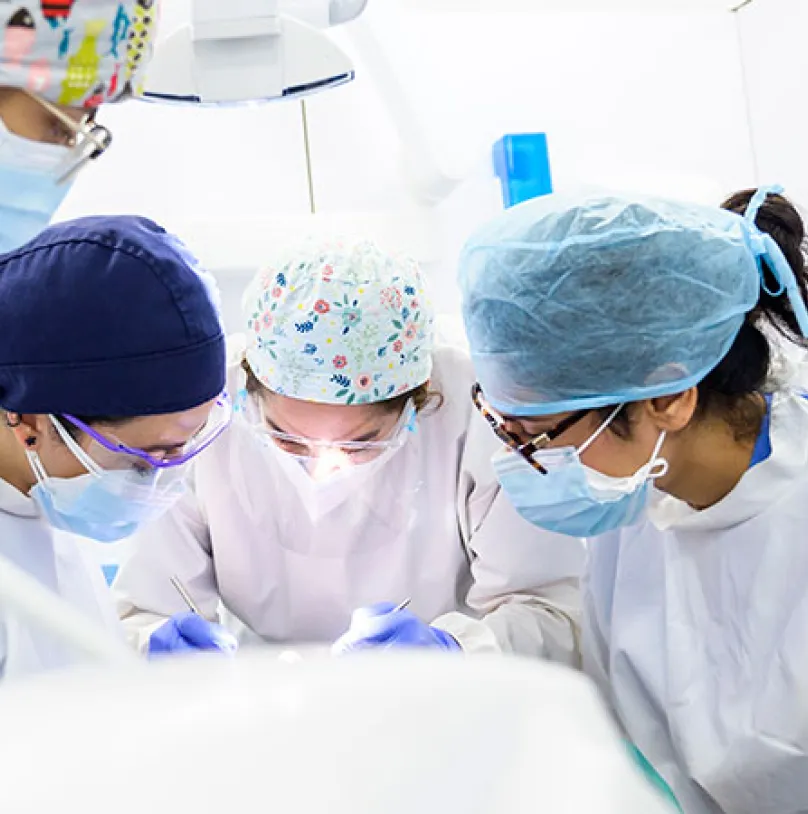 UIC Barcelona’s University Dental Clinic (CUO)
UIC Barcelona’s University Dental Clinic (CUO)UIC Barcelona’s University Dental Clinic (CUO) has 88 dental care booths, all equipped with cutting-edge technology, including:
68 general dentistry care booths
4 care booths for special-needs patients
16 surgery care booths
Care booths for conscious sedation
Agreement with the Hospital Universitari General de Catalunya (HUGC Quirón) to treat patients under general anesthesia -
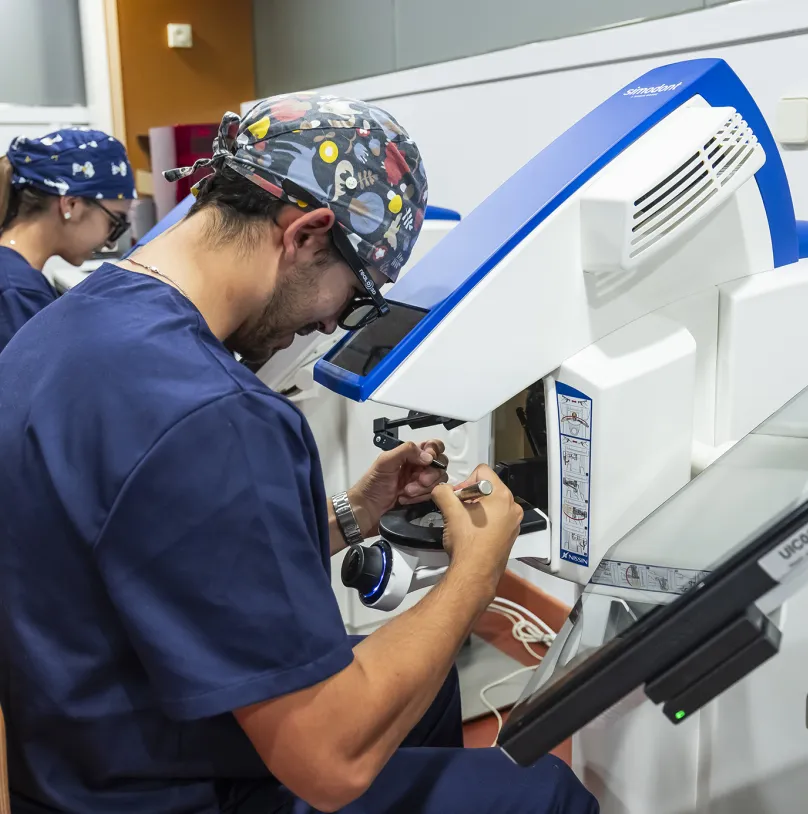 Clinical Simulation and New Technologies Classroom
Clinical Simulation and New Technologies ClassroomNew clinical simulation classroom: with this step, virtual reality is introduced into student training, enhancing their education while also serving as a valuable tool in new teaching methodologies. This is another step forward in innovation and the improvement of student training. This laboratory, together with the preclinical laboratory, allows students to practice dentistry with great realism before working on actual patients.
-
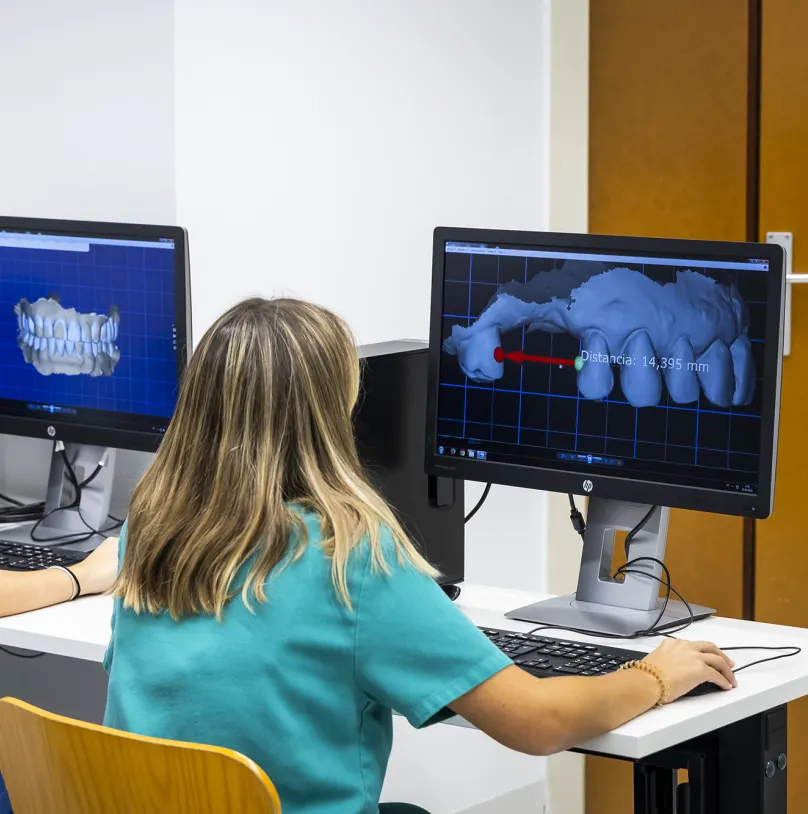 Exclusive Laboratory for CAD CAM Technology
Exclusive Laboratory for CAD CAM TechnologyPioneers in digital dentistry, the Faculty has embraced digitalization and, among other resources, has an exclusive laboratory for CAD CAM technology. The equipment in this laboratory includes milling machines, intraoral scanners, 3D printers, design software, a ceramic furnace, a zirconia sintering furnace, CBCT and iCat, Teckscan, Z4 laptops, and Z4 computers.
-
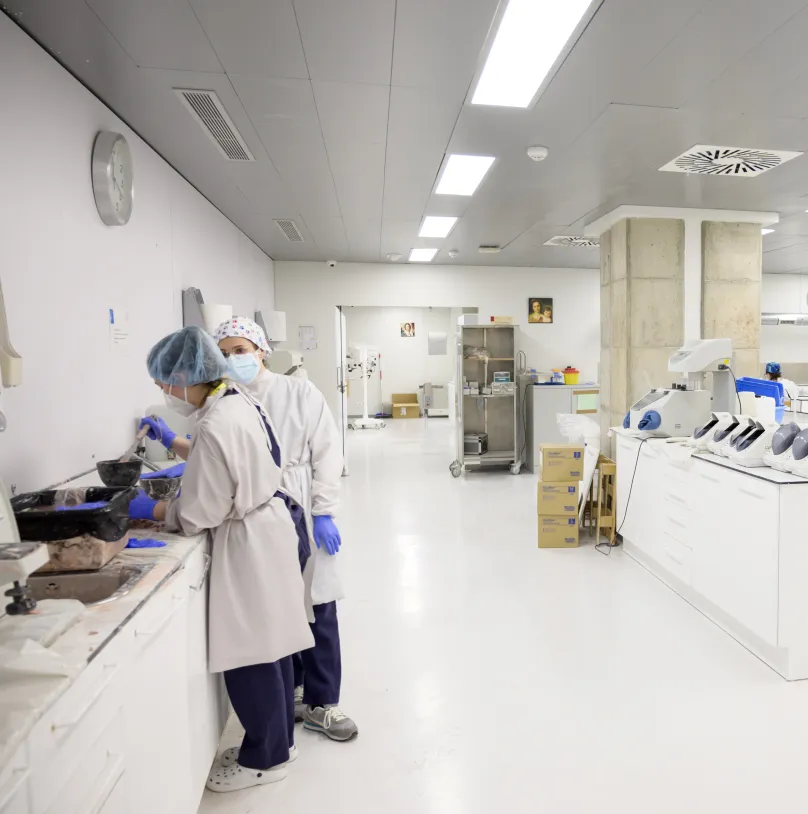 State-of-the-Art Prosthetic Laboratories
State-of-the-Art Prosthetic LaboratoriesUIC Barcelona’s Dentistry Clinic has two advanced prosthetic laboratories equipped with the latest digital imaging technology. These laboratories provide students with access to cutting-edge tools across all areas of dentistry, from prosthesis design and manufacturing to treatment planning and execution. With this high-end equipment, future professionals can practice and refine state-of-the-art techniques, preparing them to excel in a highly competitive professional environment.
-
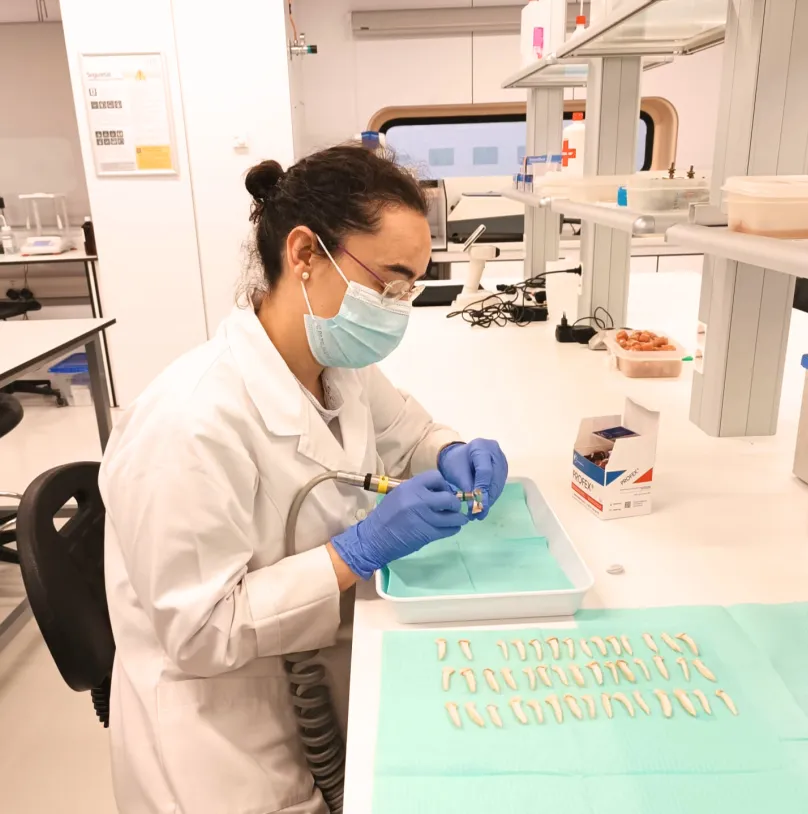 Research Laboratory
Research LaboratoryUIC Barcelona has six modern laboratories, one of which is specifically dedicated to dental research. This space allows students and professionals to conduct advanced studies and innovative projects, driving the development of new techniques and treatments in the field of dentistry. Additionally, the other laboratories provide practical and simulation environments that complement training, ensuring that students gain a comprehensive and high-quality experience in all aspects of their academic education.
-
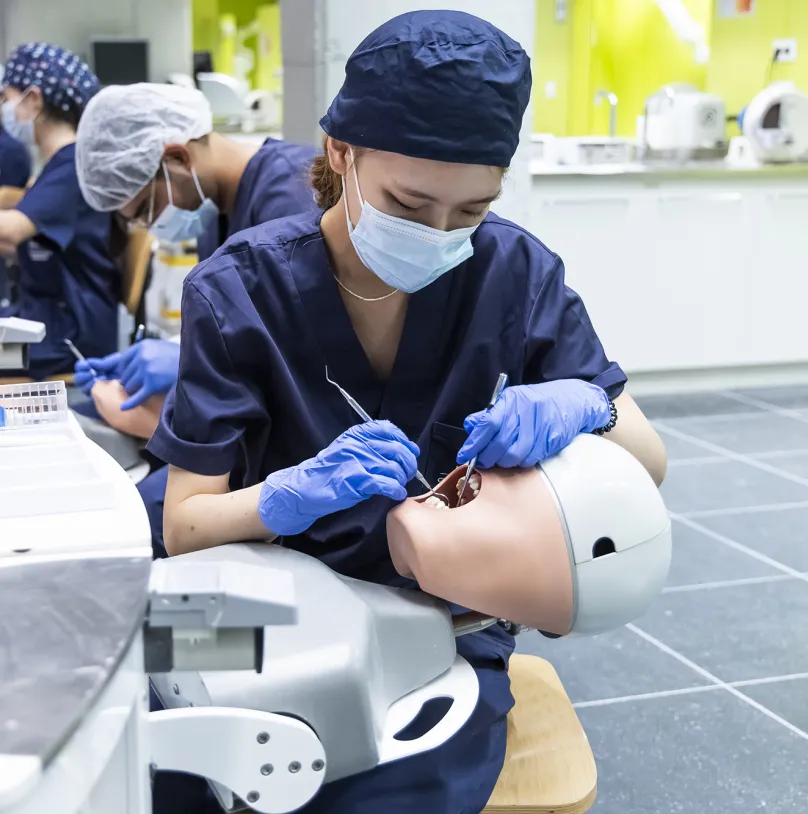 Preclinical Laboratory
Preclinical LaboratoryThe preclinical laboratory, a high-tech facility, features 95 dental simulators equipped with phantom heads—tools that simulate the oral cavity—as well as X-ray machines and digital radiology equipment for hands-on dental training.
Information sessions
Attend the next Informative Session
The University is organising open days for future university students who would like to know more about our institution and the programmes we offer.
Admission process
Admission process for master's and postgraduate programmes
-
Request information
-
Application for admission
- Delivery of documentation
- Validation of documentation
-
Assessment of candidate
-
Result of admission process
- Admission
- On hold
- No admission
-
Deposit paid
-
Enrolment
Between July and September
- Tuition paid
-
Welcome!
You are now part of UIC Barcelona
Admission requirements
- Graduate degree in Dentistry.
- B1 level or similar in Spanish, which will be assessed in the personal interview.
Application process
To start the admission process you must complete the Program Admission Form found on the University website and follow the steps to attach the following required documentation:
- Bachelor's Degree or Bachelor's Degree*.
- Academic transcripts*
- DNI or Passport
- Curriculum Vitae
- General Conditions Document
- Letter/s of recommendation (recommended, not mandatory).
*For students from outside the European Union, both the grades and the Degree certificate must be legalized through diplomatic channels or must bear La Haya Apostille. (No homologated degree is required).
Candidates who are in their final year of studies must provide the academic transcript of grades updated to the date of registration.
Once all the documentation has been received and checked for validity, the registration fee of €90** must be paid and the receipt of payment must be sent to the following e-mail address: infodonto@uic.es (Alumni of UIC Barcelona are exempt from this payment), (**non-refundable for administration costs).
The last step is the personal interview with the directors/coordinators of the Program in which the following will be assessed: academic record, personal profile, motivations and aptitudes. The interviews will be held face-to-face on dates that will be confirmed once the previous steps of the process have been completed.
Prices, grants and financial aid
Price
Grants
UIC Barcelona offers various fellowships supported by both public institutes (MEC or AGUAR), as well as private UIC Barcelona funds.
For further information, please check with our admissions department:
Grants offered by UIC Barcelona for master's degrees and postgraduate programmes
Other grants
Those pursuing master's degrees or postgraduate programmes studies at UIC Barcelona are also eligible for other scholarships.
Financing
In order to make tuition fee payments easier for students, UIC Barcelona offers various financing options through its partner banks.
